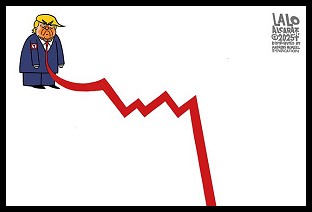 We continue to do all that we can on The BradCast to sound the alarm about the perilous state of democracy in the U.S. right now, as Republicans around the country work to pass laws to make it harder for Democrats to vote and to allow Republicans to outright reverse election results if Plan A doesn't work. [Audio link to full show is posted below this summary.]
We continue to do all that we can on The BradCast to sound the alarm about the perilous state of democracy in the U.S. right now, as Republicans around the country work to pass laws to make it harder for Democrats to vote and to allow Republicans to outright reverse election results if Plan A doesn't work. [Audio link to full show is posted below this summary.]
The heroic Democratic Texas state law makers who walked out of the state's House of Representatives at the end of the legislative session over the weekend to prevent a quorum from passing a sweeping new GOP voter suppression bill, as detailed on yesterday's show, are begging lawmakers in Congress for a "national response" to protect voting rights. They can only hold off the suppression for so long in the Lone Star State, as other GOP-controlled states do the same, as Democrats in Congress are crippled by archaic institutional processes like the filibuster.
The situation has become dangerous enough that 100 academic democracy scholars on Tuesday issued a "Statement of Concern" about Republican "initiatives" around the country which the group describe as "transforming...states into political systems that no longer meet the minimum conditions for free and fair elections," leaving "our entire democracy...now at risk." One of those scholars joins us today to discuss those concerns, what can be done about them, and whether or not the American public and Democrats in Congress truly appreciate the dire state that the usually staid academics are now trying to sounds their own alarm about.
But, first, in some other democracy-related news today, the Federal Elections Commission announced they are fining American Media Inc., parent company of the National Enquirer, $187,500 for its role in the hush-money payments made to Playboy model Karen McDougal before the 2016 election. The payments, like those made to adult film actress Stormy Daniels, were meant to keep the women quiet about sexual affairs each say they had with Donald Trump.
The FEC fine is for the unlawful, unreported "in-kind contribution" to Trump's campaign, meant to "suppress" McDougal's story and "prevent" it from influencing the election, according to the settlement between the FEC and AMI. So, AMI has now been fined and Trump's personal lawyer, Michael Cohen, was sentenced to prison for his part in what both he and the Dept. of Justice described as a "conspiracy" that was "directed" by Trump. So far, however, the disgraced former President who orchestrated the entire scheme has yet to be held accountable for it. The DoJ has until August to do so, before the statute of limitations on Trump's crime runs out.
In other less-criminal democracy news today, New Mexico's Democratic state Rep. Melanie Stansbury won a special election for the U.S. House on Tuesday in a "landslide victory" against her oil and gas industry supporting Republican opponent. The election was to fill the seat vacated by Rep. Deb Haaland, Joe Biden's new Interior Department chief. Republicans were hoping that the margin, even if they lost in a very Democratic-leaning jurisdiction, would be an encouraging bellwether in advance of the 2022 mid-terms. It didn't work out that way. While Biden won NM's 1st Congressional District in 2020 by 23 points and Haaland won her seat that same year by 16 points, Stansbury reportedly trounced Republican Mark Moores on Tuesday by nearly 25 points! If the race was a bellwether, it will be seen as very good one indeed for Democrats today.
Then we're joined by author, columnist and Roosevelt University political scientist DAVID FARIS, a longtime friend of the show and one of the scholars who signed on to that previously mentioned "Statement of Concern" about American democracy, in which the group pleads for action at the federal level to save democracy, including passage of election reform and safeguards such as the John Lewis Voting Rights Advancement Act and the For the People Act.
Our conversation with Faris comes the day after President Biden, in Tulsa on Tuesday, called for "a month of action on Capitol Hill", calling out (if not by name), "two Senators" who are blocking critical election and campaign finance reform by refusing to reform the filibuster to allow passage of the sweeping Democratic bills that the scholars, the Texas lawmakers, and many others across the nation are begging for in advance of 2022. Those two Senators, of course, are West Virginia's Joe Manchin and Arizona's Kyrsten Sinema, Democrats who are still refusing to reform the filibuster to allow passage of the election protection bills.
"My fear is that Democrats are going to lose the House and the Senate next year," Faris tells me, "which in and of itself is not the end of the world. But there's another catastrophe galloping towards us, which is this Republican plot to steal the 2024 election, with a newer, better, more invigorated version of Trump's sloppy plot to do it in 2020. The worst-case scenario here is Democrats lose Congress next year, they lose a bunch of critical governorships in the battleground states, and Secretary of State races [and] we have a very similar result in 2024 --- that is, close outcomes in the tipping point states in the Electoral College. And then Republican legislatures and Governors in Michigan, Wisconsin, Pennsylvania, Arizona, Georgia, who knows where else, simply send Republican electors to Congress instead of whoever was chosen by the voters themselves."
That, he explains, is what Republicans in those states are currently angling for, including with the passage of state laws to make all of it easier. If GOP state lawmakers are elected with a minority of votes thanks to gerrymandering (which would be prevented by the For the People Act), who then select slates of Presidential Electors that a minority of voters voted for, and federal laws to prevent that are blocked by a House and Senate with GOP legislators also elected by a minority of voters to install a President who received a minority of the vote, under laws approved by a U.S. Supreme Court with a GOP majority stolen and packed by both a Senate and President who received a minority of votes, it would be "a world-historical catastrophe for American democracy." Nonetheless, Faris and the others now very much see that as a possibility.
"We've graduated from routine Republican voter suppression and election interference, sort of low-level election theft, to what I think of as a more integrated plot to install their preferred candidate in 2024." It's something that Faris --- and his fellow scholars --- are now "increasingly worried about."
"I do think there is a sense among a majority of the Democratic caucuses in both chambers of Congress that reforms are important," he concedes. "I think that that they know that Republicans are up to no good. What I don't think they understand is that it is an existential problem at this point --- that we may have only one or two elections left before Republicans do so much damage to the institutions of democracy, or they do something so outrageous that it could lead to some kind of violent, or maybe non-violent, crackup of the country, which is what I'm most concerned about."
What, if anything can be done about it? Do Manchin and Sinema really care? Are Joe Biden and the Democrats doing all that they can to change what now appears to be a grim outlook for the chances of real reform? And, if that reform miraculously somehow happens, will it be enough to actually prevent the worst-case scenarios that Faris and his scholarly colleagues are now so alarmed about?
We discuss all of that and more on today's...as usual...somewhat alarming BradCast...
(Snail mail support to "Brad Friedman, 7095 Hollywood Blvd., #594 Los Angeles, CA 90028" always welcome too!)
|


 Trump EPA Guts Enviro Justice Office: 'BradCast' 4/24/25
Trump EPA Guts Enviro Justice Office: 'BradCast' 4/24/25 'Green News Report' 4/24/25
'Green News Report' 4/24/25
 Nation's Largest Broadcaster Mandates News Outlets Hoax Viewers to Help Gut FCC Rules: 'BradCast' 4/23/25
Nation's Largest Broadcaster Mandates News Outlets Hoax Viewers to Help Gut FCC Rules: 'BradCast' 4/23/25 Trump's FCC on Precipice of Ending All Limits on Corporate Control of Local TV Stations
Trump's FCC on Precipice of Ending All Limits on Corporate Control of Local TV Stations GOP Earth Day 2025 Hypocrisies and Dilemmas: 'BradCast' 4/22/25
GOP Earth Day 2025 Hypocrisies and Dilemmas: 'BradCast' 4/22/25 'Green News Report' 4/22/25
'Green News Report' 4/22/25 Pope Francis Dies,
Pope Francis Dies, Sunday
Sunday  Sunday 'Zero Day' Toons
Sunday 'Zero Day' Toons Soc. Sec. Expert Warns DOGE Hastening Collapse, Privati-zation: 'BradCast' 4/10/2025
Soc. Sec. Expert Warns DOGE Hastening Collapse, Privati-zation: 'BradCast' 4/10/2025 'Green News Report' 4/10/25
'Green News Report' 4/10/25 Trump Blinks, Chaos Reigns, Markets Spike as Many Tariffs Remain Despite 90-Day 'Pause': 'BradCast' 4/9/25
Trump Blinks, Chaos Reigns, Markets Spike as Many Tariffs Remain Despite 90-Day 'Pause': 'BradCast' 4/9/25 SCOTUS Deportation Ruling Grimmer Than First Appears: 'BradCast' 4/8/25
SCOTUS Deportation Ruling Grimmer Than First Appears: 'BradCast' 4/8/25 'Green News Report' 4/8/25
'Green News Report' 4/8/25 Cliff Diving with Donald: 'BradCast' 4/7/25
Cliff Diving with Donald: 'BradCast' 4/7/25 Sunday 'Don't Look Down' Toons
Sunday 'Don't Look Down' Toons 'Green News Report' 4/3/25
'Green News Report' 4/3/25 'Mob Boss' Trump's Trade Sanctions Tank U.S., World Markets: 'BradCast' 4/3/25
'Mob Boss' Trump's Trade Sanctions Tank U.S., World Markets: 'BradCast' 4/3/25 Crawford Landslide in WI; Booker Makes History in U.S. Senate: 'BradCast' 4/2/25
Crawford Landslide in WI; Booker Makes History in U.S. Senate: 'BradCast' 4/2/25 Judge Ends Challenge to GA's Unverifiable, Insecure Vote System: 'BradCast' 4/1/25
Judge Ends Challenge to GA's Unverifiable, Insecure Vote System: 'BradCast' 4/1/25 Bad Court, Election News for Trump is Good News for U.S.: 'BradCast' 3/31
Bad Court, Election News for Trump is Good News for U.S.: 'BradCast' 3/31 Vets Push Back at Plan to Slash Health Care, 80K V.A. Jobs: 'BradCast' 3/27/25
Vets Push Back at Plan to Slash Health Care, 80K V.A. Jobs: 'BradCast' 3/27/25 Signal Scandal Worsens for Trump, GOP; Big Dem Election Wins in PA: 'BradCast' 3/26
Signal Scandal Worsens for Trump, GOP; Big Dem Election Wins in PA: 'BradCast' 3/26 'Emptywheel': Trump NatSec Team Should 'Resign in Disgrace': 'BradCast' 3/25/25
'Emptywheel': Trump NatSec Team Should 'Resign in Disgrace': 'BradCast' 3/25/25 USPS 'Belongs to the People, Not the Billionaires': 'BradCast' 3/24/25
USPS 'Belongs to the People, Not the Billionaires': 'BradCast' 3/24/25
 VA GOP VOTER REG FRAUDSTER OFF HOOK
VA GOP VOTER REG FRAUDSTER OFF HOOK Criminal GOP Voter Registration Fraud Probe Expanding in VA
Criminal GOP Voter Registration Fraud Probe Expanding in VA DOJ PROBE SOUGHT AFTER VA ARREST
DOJ PROBE SOUGHT AFTER VA ARREST Arrest in VA: GOP Voter Reg Scandal Widens
Arrest in VA: GOP Voter Reg Scandal Widens ALL TOGETHER: ROVE, SPROUL, KOCHS, RNC
ALL TOGETHER: ROVE, SPROUL, KOCHS, RNC LATimes: RNC's 'Fired' Sproul Working for Repubs in 'as Many as 30 States'
LATimes: RNC's 'Fired' Sproul Working for Repubs in 'as Many as 30 States' 'Fired' Sproul Group 'Cloned', Still Working for Republicans in At Least 10 States
'Fired' Sproul Group 'Cloned', Still Working for Republicans in At Least 10 States FINALLY: FOX ON GOP REG FRAUD SCANDAL
FINALLY: FOX ON GOP REG FRAUD SCANDAL COLORADO FOLLOWS FLORIDA WITH GOP CRIMINAL INVESTIGATION
COLORADO FOLLOWS FLORIDA WITH GOP CRIMINAL INVESTIGATION CRIMINAL PROBE LAUNCHED INTO GOP VOTER REGISTRATION FRAUD SCANDAL IN FL
CRIMINAL PROBE LAUNCHED INTO GOP VOTER REGISTRATION FRAUD SCANDAL IN FL Brad Breaks PA Photo ID & GOP Registration Fraud Scandal News on Hartmann TV
Brad Breaks PA Photo ID & GOP Registration Fraud Scandal News on Hartmann TV  CAUGHT ON TAPE: COORDINATED NATIONWIDE GOP VOTER REG SCAM
CAUGHT ON TAPE: COORDINATED NATIONWIDE GOP VOTER REG SCAM CRIMINAL ELECTION FRAUD COMPLAINT FILED AGAINST GOP 'FRAUD' FIRM
CRIMINAL ELECTION FRAUD COMPLAINT FILED AGAINST GOP 'FRAUD' FIRM RICK SCOTT GETS ROLLED IN GOP REGISTRATION FRAUD SCANDAL
RICK SCOTT GETS ROLLED IN GOP REGISTRATION FRAUD SCANDAL VIDEO: Brad Breaks GOP Reg Fraud Scandal on Hartmann TV
VIDEO: Brad Breaks GOP Reg Fraud Scandal on Hartmann TV RNC FIRES NATIONAL VOTER REGISTRATION FIRM FOR FRAUD
RNC FIRES NATIONAL VOTER REGISTRATION FIRM FOR FRAUD EXCLUSIVE: Intvw w/ FL Official Who First Discovered GOP Reg Fraud
EXCLUSIVE: Intvw w/ FL Official Who First Discovered GOP Reg Fraud GOP REGISTRATION FRAUD FOUND IN FL
GOP REGISTRATION FRAUD FOUND IN FL



















 Desi and I are back on today's
Desi and I are back on today's  Thank God it's Friday! I don't think I could take another day like this one. It's
Thank God it's Friday! I don't think I could take another day like this one. It's  On today's
On today's  On today's
On today's  On today's
On today's  We try like crazy to avoid sleazy, tabloid sensationalism on
We try like crazy to avoid sleazy, tabloid sensationalism on  "A republic," Ben Franklin famously said, "if you can keep it."
"A republic," Ben Franklin famously said, "if you can keep it." On today's
On today's  Today's
Today's 








 Among the many stories covered on today's
Among the many stories covered on today's  On today's
On today's  On today's
On today's 













